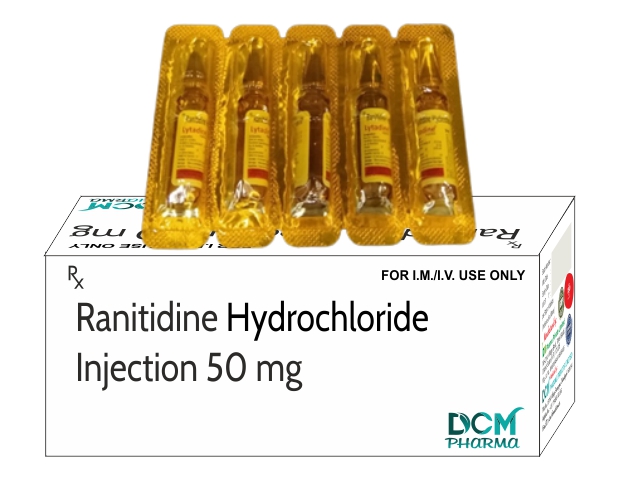Indications
Indicated for the treatment of duodenal ulcer, benign gastric ulcer, post - operative ulcer, and of Zollinger - Ellison Syndrome. (In the management of conditions where reduction of gastric secretion and acid output is desirable, such as reflux esophagitis).
Medicinal Benefits
In Treatment of Gastroesophageal reflux disease (Acid reflux)
Gastroesophageal reflux disease (GERD) is a chronic condition. It happens because a muscle above your stomach relaxes too much and allows stomach contents to come back up into your esophagus and mouth. Ranitidine injection reduces the amount of acid your stomach makes and relieves the pain associated with heartburn and acid reflux.
In Treatment of Peptic ulcer disease
Stomach ulcers are usually caused by non-steroidal anti-inflammatory drugs (NSAIDs) or Helicobacter pylori bacteria. They both break down the stomach's defense against the acid it produces to digest food. This damages the stomach and allows an ulcer to form. Ranitidine injection may be used to treat these ulcers. It reduces the amount of acid your stomach makes, preventing further damage to the ulcer as it heals naturally
Mechanism of action
Ranitidine hydrochloride is a competitive, reversible inhibitor of the action of histamine at the histamine H2-receptors, including receptors on the gastric cells. Ranitidine hydrochloride does not lower serum Ca++ in hypercalcemic states. This reduces the amount of acid in the stomach. The drug starts to work in as little as 30 minutes. It can control acid production for up to 12 hours and reduce the frequency and severity of heartburn
Drug Interactions
Efavirenz
● Nevirapine
● Acarbose
● Atazanavir
Side Effects
● Diarrhea
● Constipation
● Headache
● Nausea
● Stomach upset
● Pain at the site of injection
Precautions & Warning
< If you are pregnant, trying to become pregnant, or are breastfeeding, ask your doctor or nurse for advice before being given Ranitidine injection. If this happens to you, do not drive or use machinery.
● If you have a kidney or liver problems
● Keep out of reach of the children
Give a warning, caution, and storage as on the label.
Dosage
Take this medicine in the dose and duration as advised by your doctor. Swallow it as a whole. Calcium dobesilate may be taken with or without food, but it is better to take it at a fixed time.
You should keep taking this medicine for as long as your doctor recommends.
Missed Dose:
If you miss a dose of the Calcium dobesilate capsule, take it as soon as possible. However, if it is almost time for your next dose, skip the missed dose and go back to your regular schedule. Do not double the dose.
Overdosage:
A small overdose is no cause for concern. In case of an intentional large overdose, seek emergency medical attention.
Contraindications:
● Hypersensitivity to any of the ingredients used in the Calcium dobesilate
● It is unsafe to consume alcohol with Calcium dobesilate capsule Disclaimer:The data uploaded is made from content already available on internet.The company holds no right of it and is not responsible for any wrong information.
